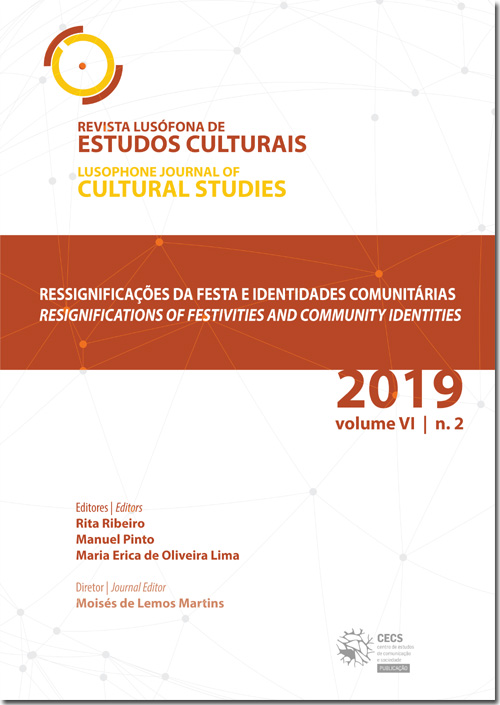Terno de Reis: between tradition and an update on identity in the Quilombola community of Nova Esperança
DOI:
https://doi.org/10.21814/rlec.2113Keywords:
Terno de Reis, culture, identity, Nova EsperançaAbstract
This paper aims to analyze how Three Kings day, a cultural expression present in several Brazilian communities, in this case the Quilombola Community of Nova Esperança, municipality of Wenceslau Guimarães, Bahia, keeps tradition regardless of the various cultural influences from contemporary shifting identities. According to the narratives of participants in Terno de Reis, the celebration is an important element in the reaffirmation of local identity and, above all, of the bonds of common ancestry with the founder of the community. When discussing the dynamics that involve the whole celebration of Three Kings day, it becomes pertinent to weigh culture as something dynamic, alive in time and space, capable of (re)acquiring new meanings and re-igniting the memory of the people who have a continuous relationship with both the past and the present. The narratives also show concern for the survival of this celebration in the face of the eminent threats that it suffers as a result of the liquidity of contemporary social relationships.
Downloads
References
Alberti, V. (2005). Histórias dentro da História. In C. B. Pinsky (Ed.), Fontes históricas (pp. 155-191). São Paulo: Contexto.
Almeida, A. W. B. (2006). Terras de quilombo, terras indígenas, “Babaçuais Livres”, “Castanhais do Povo”, faxinais e fundos de pasto: terras tradicionalmente ocupadas. Manaus: PPGSCA-UFAM.
Almeida, W. B. (2011). Quilombolas e novas etnias. Manaus: UEA Edições.
Arruti, J. M. (2006). Mocambo: Antropologia e História do processo de formação de quilombola. Bauru: Edusc.
Barth, F. (2000). O guru, o iniciador e outras variações antropológicas. Rio de Janeiro: Contra Capa Livraria.
Dubar, C. (1997). Para uma teoria sociológica da identidade. In A socialização (pp. 133- 156). Porto: Porto Editora.
Canclini, N. G. (1997). Culturas híbridas: estratégias para entrar e sair da modernidade. São Paulo: Edusp.
Gonçalves, M.C.S. (2008). Folias de reis: o eco da memória na (re)construção da performance e identidade dos foliões em João Pinheiro, estado de minas gerais. IV Enecult - Encontro de Estudos Multidisciplinares em Cultura (p. 6). Universidade Federal da Bahia. Salvador, Brasil.
Gusmão, N. M. M. de (1995). Terra de pretos, terra de mulheres. Terra, mulher e raça num bairro rural negro. Brasília: Fundação Cultural Palmares.
Gusmão, N. M. M. de. (1979). Campinho da independência: um caso de proletarização caiçara. Dissertação de Mestrado, Pontifícia Universidade Católica, São Paulo, Brasil.
Hall, S. (2006). A identidade cultural na pós-modernidade. Rio de Janeiro: Editora DP&A.
Hall, S. (2011). Quem precisa de identidade? In T. T. Silva (Ed.), Identidade e diferença (pp. 103- 132). Petrópolis, RJ: Vozes.
Queiroz, R. da S. (1983/2006). Caipiras negros no Vale do Ribeira: um estudo de antropologia econômica. São Paulo: EDUSP.
Meihy, J. C. S. B. (1998). Manual de história oral. São Paulo: Loyola.
Moura, C. (1981). Rebeliões da senzala: quilombos, insurreições, guerrilhas. São Paulo: Editora Ciências Humanas.
Munanga, K. & Gomes, N. L. (2006). O negro no Brasil de hoje. São Paulo: Editora Global.
Pergo, V. L. Os rituais na folia de reis: uma das festas populares brasileiras. Retirado de http://www.dhi.uem.br/gtreligiao/pdf/st1/Pergo,%20Vera%20Lucia.pdf.
Rios, S. (2006). Os cantos da festa do reinado de Nossa Senhora do Rosário e da Folia de Reis. Sociedade e Cultura, 9(1), 65-76.
Wagner, R. (2011). A invenção da cultura. São Paulo: Cosac Naify.
Downloads
Published
How to Cite
Issue
Section
License
Authors own the copyright, providing the journal with the right of first publication. The work is licensed under a Creative Commons - Atribuição 4.0 Internacional License.








